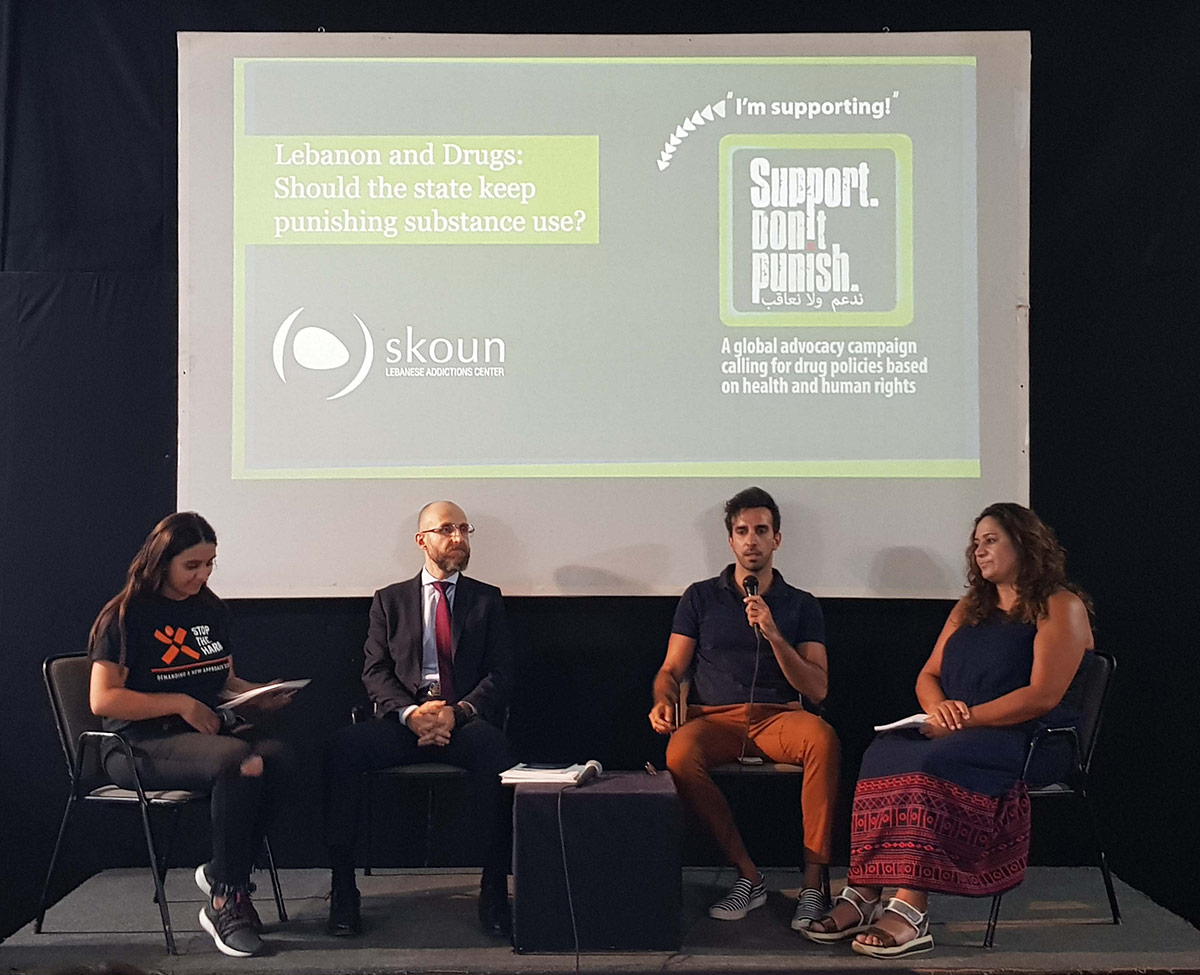
The legal and public health aspects as well as the merits of decriminalizing drug use and its feasibility as a response to drugs in Lebanon were explored at a panel discussion organized by Skoun, Lebanese Addictions Center, entitled “Lebanon and Drugs: Should the State Keep Punishing Substance Use”, which took place on June 26 at Station Beirut, Sin el Fil.
The panel discussion was timed to coincide with the global day of action Support. Don’t Punish, which calls for drug policies based on health and human rights.
During the discussion, Karim Nammour, lawyer and board member at the Legal Agenda, explained the legal concept of decriminalizing drug use means, emphasizing on the fact “that it is not the same as legalization.” He further went on to explain that “the State should think about the general interest and about building policies to invalidate the legal bases for prosecution and punishment for drug charges.” Nammour also provided a set of arguments that need to be taken into consideration when discussing decriminalization, including scientific, legal, financial and economic arguments.
Commenting on the Lebanese context, Dr Rabih Chammay, head of the National Mental Health Program at the Ministry of Public Health, explained that the Lebanese Inter-Ministerial Substance Use Response Strategy for Lebanon 2016-2021 sets “the decriminalization of illicit drug use” as one of its objectives. Prompted by the moderator, Sandy Mteirik, the Drug Policy department manager at Skoun, to discuss the foreseeability of adopting such an approach in Lebanon given that the strategy sets the year 2021 as a deadline, Dr. Chammay stated “we’re attempting to change the culture of an entire society, so that everyone has a part to play in order to attain this objective.''
Chammay added: “Scientifically speaking, all substances (both licit and illicit) lead to addiction and this is reflected in our strategy. Our objective is to create a national response ranging from governmental bodies to civil societies and individuals who suffer from addiction”, pointing out that the strategy’s objectives are: reducing the spread of hematogenous infections caused by needle exchange; lowering the mortality rate by overdose and reducing the societal stigmatization, which should be accompanied by efforts to reduce the rate of disruption caused by addiction, and to delay the age of initial drug use.
For her part, journalist and activist Saada Allaw gave life to the harms caused by the repressive policies of the state, by sharing real life stories of people arrested for drug use in Lebanon.
Allaw also presented the state of prisons, which she deemed not suitable to rehabilitation and underlined: “After their imprisonment, addicts have no job opportunities and no social life.”
At the event, Dr. Ramzi Haddad, co-founder et head of the clinical department at Skoun, also presented a first of its kind survey conducted by the organization in 2018 among young people in Lebanon to gauge their substance use patterns and behaviours as well as their attitudes and opinions around drug related topic.
The results of the survey, funded by European Union and implemented in partnership with Soins Infirmiers et Développement Communautaire (SIDC), were collected from 3,274 young people aged between 18 and 35 years old from across Lebanon with a focus on Beirut, Keserwan, Saida, Sour and Tripoli.
The results showed that the most commonly used substances in Lebanon are alcohol, tobacco products, cannabis and opiates; with 25% of respondents reporting that they have ever used an illicit or non-prescribed substance.
Among the illicit substances used, cannabis comes in first place (92%), followed by Cocaine (22%) and Salvia (20%).
The results also showed that while a substantial majority of respondents stated that it was easy for them to acquire illicit substances, a significant number of them (68%) also reported that they knew somebody who had been arrested for drug use. When asked “Should the state punish people who use drugs?”, a non-negligible 44% of respondents disagreed with the state’s approach to drug use.
The discussion also revolved around the survey’s role, as Dr. Haddad stated that ‘the results of this survey are important for the development of policies, for treatment centers across the country and to the State. The objective of this study was to create a participatory approach with the youth to encourage them to play an active role in policy changes.
www.skoun.org
Facebook: Skoun.org
Twitter: @skoun_org
Instagram: @skoun_org